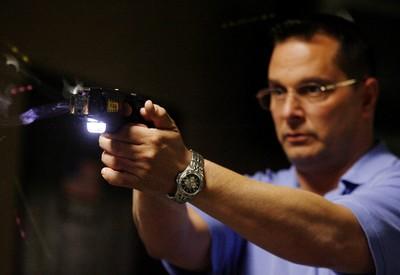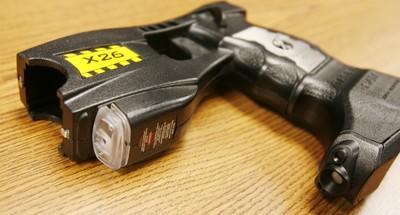Police aim to point, shoot and click
The North Las Vegas Police Department is putting camera attachments on its Tasers, and the Metropolitan Police Department may not be far behind.
Both law enforcement agencies are testing the cameras, which produce black-and-white video and audio digital recordings once the safety is turned off. The cameras attach to the butt of the Tasers.
When North Las Vegas Police Chief Mark Paresi heard about the cameras at a police conference, he immediately wanted them for his officers.
"It offers more credibility to the department," said police spokesman Tim Bedwell. "A lot of people are suspicious of the Tasers, and the video will hopefully add to their understanding of the situation officers are faced with and why they would deploy the Taser in the first place."
The department plans to buy a camera for each of its patrol officers, or about 100 at a price of $450 each. A camera can make 500 recordings over 1 1/2 hours.
Officers cannot erase the recordings, said police training officer Leonard Cardinale, a 10-year veteran. The recordings are downloaded to a computer. When there is no more space on the camera to record, the device is sent back to the manufacturer and its memory is wiped clean.
"This allows for the credibility of evidence in the courtroom," Cardinale said.
The Taser sends 50,000 volts, either through two wires tipped with metal hooks that shoot about 21 feet or by touching the victim with the device. The shocks repeatedly tense a person's muscles, incapacitating them. The process lasts no longer than five seconds.
The American Civil Liberties Union of Nevada supports cameras on Tasers. However, the group also believes local police are using the Taser in a way that seeks compliance with a threat.
"While I commend them for putting the cameras on these devices, they are doing it in a way that will make little difference with respect to all of the problems with the use of Tasers," ACLU Director Gary Peck said.
Peck said the real issue is the policies and training given to officers on when it is appropriate to use a Taser. He said he doesn't want the device to be used as a compliance tool, as in "put your hands on the car or I will Taser you."
Instead, Peck wants the Taser, which he calls a potentially lethal weapon, to be used only as an alternative to lethal force.
The Taser has been the subject of controversy across the nation as the number of deaths linked to the device has climbed into the 100s. So far, the Las Vegas Valley has had six deaths that have occurred after a Taser was used.
The ACLU is involved in a lawsuit against Taser International and the Metropolitan Police Department, which serves Las Vegas and the unincorporated areas of Clark County, regarding one of those deaths in 2004.
Peck also wants to see the two law enforcement agencies make the recordings available to the public.
"If they only share the recordings with the public when they feel like it, it would have an opposite effect than the one they are hoping for," Peck said. "Instead of inspiring public confidence, it will undermine it."
The Metropolitan Police Department has armed 58 patrol officers, about eight or nine at every substation, with a Taser and a camera attachment.
The department's testing process will continue through at least July, training officer Marcus Martin said.
From what Martin has seen, though, he believes the police department needs to invest in the cameras.
The problem is that it will cost upwards of $500,000, considering there are more than 1,200 patrol officers.
Martin believes the Taser camera is a device that officers will embrace.
"I don't know too many officers who would be opposed to it, and if they are, it would make me wonder what kind of policing they are doing," Martin said. "I think it would be wonderful for the public to see (and hear) what the subject was doing at the time we had to use the Taser."
Martin said the audio recording is supersensitive; it picks up what is being said even if the device is pointed away from the suspect.
That means all the name- calling and threats thrown at police might be recorded and could be used in court, which is something Martin said he really likes. He believes it will give juries a chance to see how a defendant acts toward police on the street, instead of seeing only a suit-wearing, properly mannered person in court.
Top brass at the Metropolitan Police Department seem to agree.
"If the tests pan out, it would be a great way to document a volatile situation, review tactics, and in the case there is misconduct or excessive force used," Assistant Sheriff Ray Flynn said.
Flynn said the department has asked its federal representatives in Congress to see if funding for the cameras can come through grants.
In the meantime, Martin points to court law in response to the ACLU's complaint about police using the Taser as a compliance tool. He said courts have maintained that police can use certain tools depending on the severity of the crime.
For a simple disobedience, such as when an anti-war demonstrator refuses to obey commands, Martin agrees the Taser should not be used.
But in the case of a domestic violence incident in which the subject is not complying with police and has physically assaulted someone, "why should an officer engage in hand-to-hand combat when a Taser can be used to prevent" an officer from being hurt, Martin said.
The Henderson Police Department did not respond to repeated requests for comment.


















